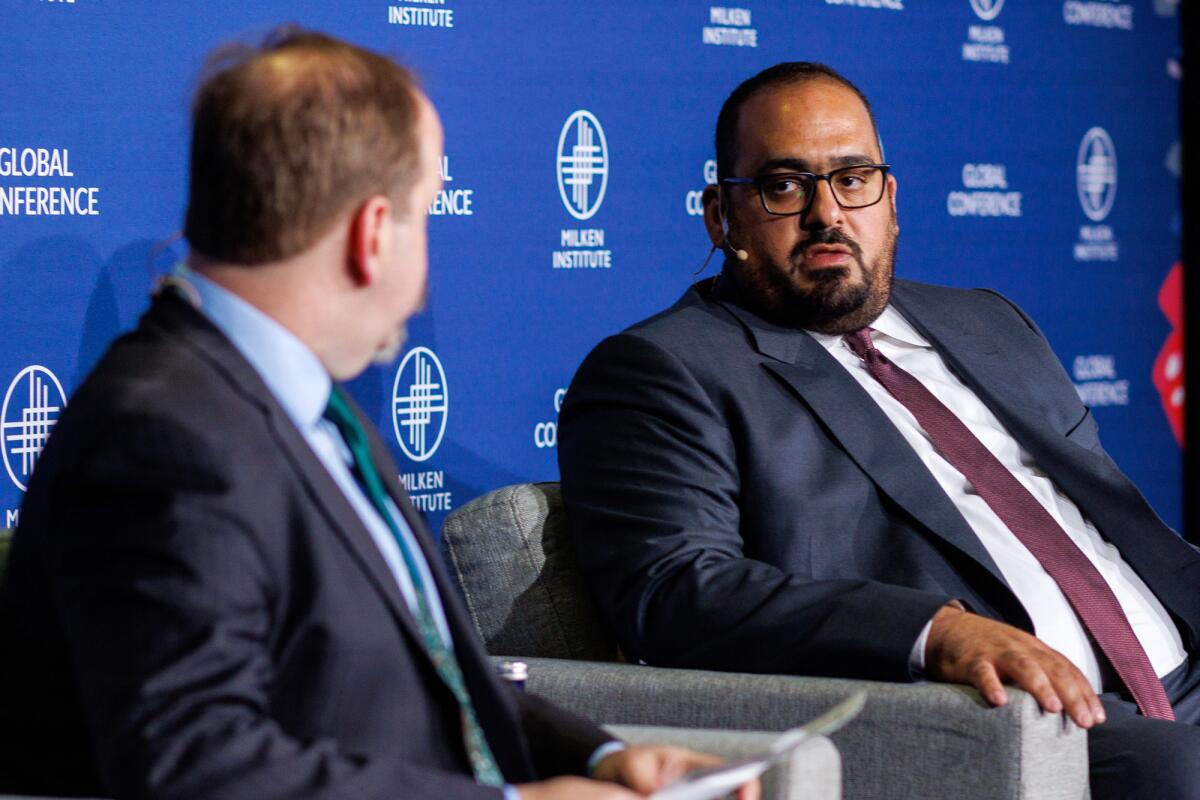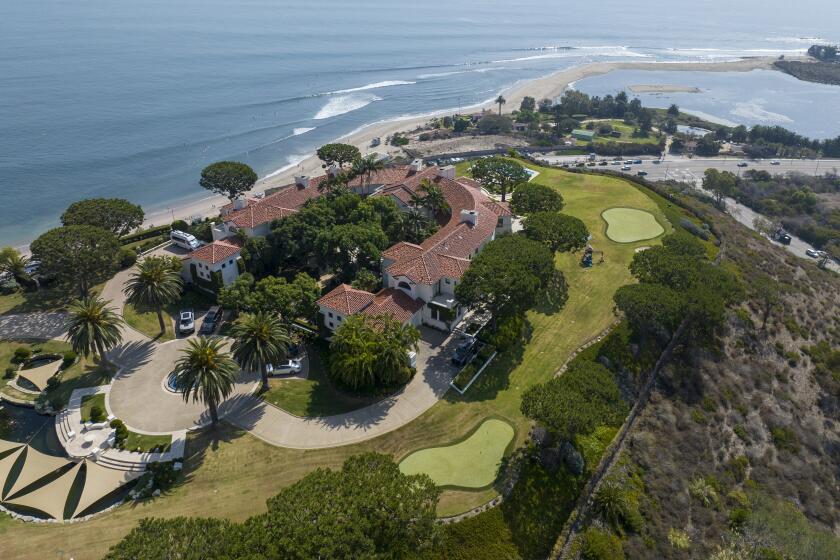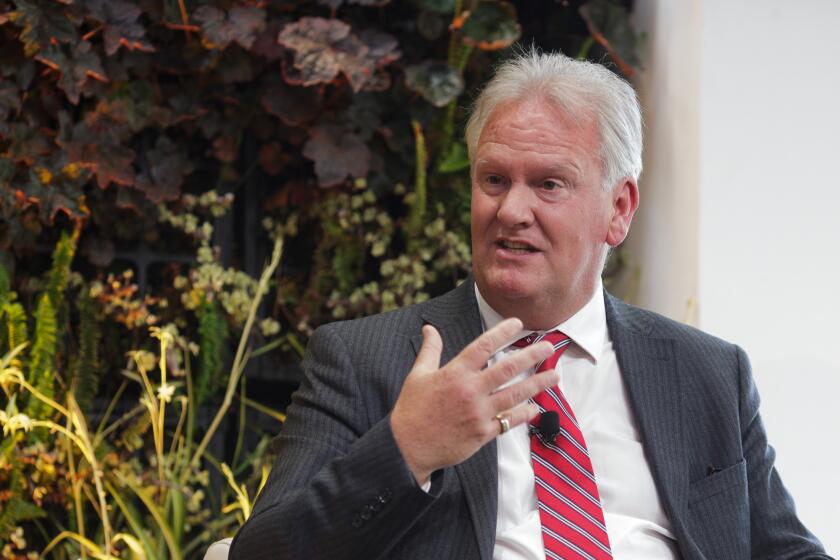Saudi Arabia comes to L.A. seeking deals to build its post-oil future

- Share via
One simple metric for measuring the Saudi government’s commitment to transforming the oil kingdom into a high-tech mecca might be the size of the delegation at this year’s Milken Institute Global Conference.
There were no fewer than four public officials and three prominent businesspeople from the Middle Eastern country featured on panels at the Beverly Hilton confab, the annual investment conference that draws some 3,500 participants and ends Wednesday.
Kristin Smith Diwan, senior resident scholar at the Arab Gulf States Institute in Washington, said that although the Saudi elite remain skeptical of American political leadership after a prolonged period of tense relations between the two countries, they still want U.S. investments.
“There has been a concerted effort to reach beyond Washington, to court finance, tech, entertainment. They want to attract global talent and investment and to be seen where these elites are gathering,” she said.
Mauricio Umansky, a Real Housewives of Beverly Hills regular and star of a new Netflix show, is accused of self-dealing in the $70-million sale of a spectacular Malibu estate seized from the vice president of Equatorial Guinea. He denies any wrongdoing.
Attracting investors and tech talent to the country is crucial as it seeks to achieve the goals of Saudi Vision 2030, an ambitious plan to expand the private sector, bringing more women and young people into the workforce, develop entertainment and tourism — and move away from a reliance on government oil revenue.
“Economic diversification is the biggest challenge we are facing. It’s what Vision 2030 mainly is targeting today,” said Faisal Alibrahim, the kingdom’s minister of economy and planning and holder of a master’s degree in business administration from MIT, who spoke at a fireside chat. “We still have more ways to go.”
Seven years into the transformation promoted by Saudi Crown Prince Mohammed bin Salman, the kingdom’s de facto ruler, the private sector contributes little more than 40% to the nation’s gross domestic product, and the goal is to raise that figure to 65%, the minister said.
The objective isn’t theoretical. The kingdom of 35 million knows it can’t rely permanently on oil revenue and government handouts, and needs to provide private-sector jobs to a growing young populace in order to make that transition. Sixty-three percent of the population is younger than 30.
“So what we want [is] to make sure ... we invest in the youth in a way that continues to empower them to be competitive,” said Alibrahim, who spoke at the only panel featuring Saudis not closed to the media, though he declined to answer direct questions from The Times.
Speakers at other panels included Khalid A. Falih, the minister of investment, and Mohammed A. Kuwaiz, chairman of the Capital Market Authority, neither of whom spoke last year, though Falih has spoken at the conference previously.
The highest-profile tech project is Neom, a futuristic planned development roughly the size of Belgium in northwest Saudi Arabia that is supposed to eventually house 9 million people. Plans call for a 106-mile-long city, laid out along one longitudinal axis, with no roads or cars, a manufacturing and tech zone, as well as tourist destinations and nature preserves.
The government estimates that it will cost $500 billion to build out the development adjacent to the Red Sea, with funds coming from the government, public and private investors and others. Sindalah, a luxury resort island in the Red Sea, is set to open first, next year.
Elon Musk says ESG investments are ‘the devil incarnate.’ Andrew Steel says they’re just misunderstood.
Andrew Leber, an assistant professor at Tulane University’s Middle East & North African Studies program, called the results of the ambitious effort to transform the oil kingdom a “mixed bag so far,” with challenges attracting foreign investment.
“It’s kind of flat-lined in recent years,” he said, outside of a massive $12-billion bond sale in 2019 by Aramco, the government oil giant.
Investment worldwide was tamped down during the pandemic and more recently by Russia’s invasion of Ukraine and rising interest rates. In 2018, Saudi Arabia faced self-inflicted damage when government security agents killed Washington Post columnist Jamal Khashoggi at the Saudi Consulate in Istanbul.
The Saudi’s own big investment conference, dubbed “Davos in the Desert,” was boycotted that year by dozens of Wall Street executives, including JP Morgan Chief Executive Jamie Dimon and BlackRock CEO Larry Fink.
The death of the government critic also prompted harsh rhetoric from President Biden during his 2020 campaign, when he pledged to turn the kingdom into a “pariah” state — but economic and geopolitical realities intervened once he was in office.
This year, the administration publicly applauded a massive $37-billion sale of Boeing passenger jets to Saudi Arabia. In July 2022, Biden traveled to the kingdom, where he fist bumped with the crown prince, drawing a backlash. But the actions weren’t lost on investors.
“The U.S. government has signaled that the doors are open, that there’s this new relationship emerging,” said Karen Young, a senior research scholar at Columbia University’s Center on Global Energy Policy. “And so that signals to the business community that it’s full steam ahead.”
The Saudi government’s interest in tech investing goes two ways: It has been pouring money into tech firms in the U.S. and globally while simultaneously seeking direct foreign investment. It operates through multiple channels.
The massive Saudi Public Investment Fund funneled $45 billion into Masayoshi Son’s Softbank Vision Fund, which has stakes in TikTok owner ByteDance and leading financial tech firm Chime. It sold off its stake in Uber last year.
Last month, the sovereign wealth fund’s venture arm, Sanabil, released a list of its investments, which included prominent names such as Peter Thiel’s Founders Fund, Andreesen Horowitz and private equity giant KKR. Among the direct investments was Santa Monica scooter maker Bird.
The Saudi Future Investment Initiative Institute has been seeking cutting-edge environmental, social and governance investments worldwide as the peninsula becomes more heat stressed amid climate change and the kingdom develops renewable energy sources and other technologies.
Leber said that while the Saudi government needs direct foreign investments to create jobs for its citizens, high oil prices have given it loads of capital to invest outside the country — with an expectation of more than just a financial return.
“I guess, in the long run, there’s the hope that maybe some of these major tech investments they’re trying to make now can eventually be bent back towards encouraging some kind of investment in Saudi Arabia,” he said.
Kevin Klowden, chief global strategist at the Milken Institute, said the Saudi leaders are playing it smart.
“They are basically hedging their bets and saying, ‘Because we are investing, we are not getting left behind,’” he said.
More to Read
Inside the business of entertainment
The Wide Shot brings you news, analysis and insights on everything from streaming wars to production — and what it all means for the future.
You may occasionally receive promotional content from the Los Angeles Times.













